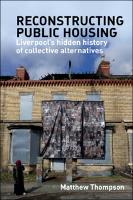Reconstructing Public Housing
Liverpool’s hidden history of collective alternatives
Abstract
Reconstructing Public Housing unearths Liverpool’s hidden history of radical alternatives to municipal housing development and builds a vision of how we might reconstruct public housing on more democratic and cooperative foundations. In this critical urban history, Matthew Thompson brings to light how and why this remarkable city became host to two pioneering social movements in collective housing and urban regeneration experimentation. In the 1970s, Liverpool produced one of Britain’s largest, most democratic and socially innovative housing co-op movements, including the country’s first new-build co-op to be designed, developed and owned by its member-residents. Four decades later, in some of the very same neighbourhoods, several campaigns for urban community land trusts are growing from the grassroots – including the first ever architectural or housing project to be nominated for and win, in 2015, the art world’s coveted Turner Prize. Thompson traces the connections between these movements; how they were shaped by, and in turn transformed, the politics, economics, culture and urbanism of Liverpool. Drawing on theories of capitalism and cooperativism, property and the commons, institutional change and urban transformation, Thompson reconsiders Engels’ housing question, reflecting on how collective alternatives work in, against and beyond the state and capital, in often surprising and contradictory ways.
Keywords
labour; housing; co-operative; Liverpool; community; policy; urbanISBN
9781789621082Publisher
Liverpool University PressPublisher website
https://www.liverpooluniversitypress.co.uk/Publication date and place
2020Classification
Social and cultural history
Urban and municipal planning and policy


 Download
Download Web Shop
Web Shop